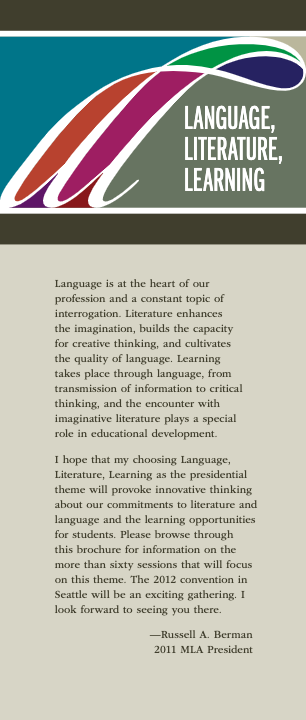Modern Language Association Presidential Forum
January 6, 2011
This presidential forum explores the question: What Makes language literary? Here is an excerpt from Alexa Alice Joubin’s remarks:
Literary texts are often strangers at home. They defamiliarize what is part of banal experiences and everyday utterances while offering something recognizable through a new language and form. Textual historicity makes language literary, and textual mobility makes language literary.
Let me begin with the first proposition: Historicity makes language literary. Over the past century, linguistics, formalism, and structuralism have taught us that, in accord with what Roman Jakobson argues in his decontextualized approach to language, literature tends to focus on the utterance and not necessarily its content. Through meter and parallelism, literary texts exploit fundamental rules of verbal behavior and call attention to the forms of expression. Unlike pigments that make up a painting or individual music notes that constitute a musical work (both of which are usually transparent to the audience), literary language draws attention to its form. This is one of the functional explanations for literature’s deliberate lack of full interpretability, but it is inadequate when dealing with forces beyond the text proper.
Let us now consider the second proposition: textual mobility makes language literary. The afterlife of a literary work in its varied translations (into different verbal and visual languages) also contributes to its literariness. In other words, the mobility of a text expands its ecological environment. The “linguistic hospitality” ensures that text’s presence over long periods of time.
By asking what makes language literary we are probing the very foundation of our profession, which will enable us to rebuild it in a time when higher education and particularly the humanistic disciplines are under attack. We will do so by teaching about translation, by teaching with translation, and by teaching against translation..
